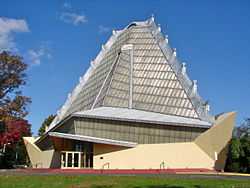Elkins Estate
Elkins Estate is a 42-acre (170,000 m2) estate located in Elkins Park, Montgomery County, Pennsylvania. The estate contains seven buildings, the most notable being Elstowe Manor and Chelten House, both Horace Trumbauer designed mansions. Elstowe Manor was built in 1898 at the location where "Needles", the former family summer home of William L. Elkins had stood. Elkins, a prominent Philadelphia businessman, was integral in the formation of the Pennsylvania Railroad Company and SEPTA.
Elstowe Manor
The 45 room Manor was built in the style of Italian High Renaissance. The unique interior features, such as the ornate carved wood and gilded molding, marble columns and accents, frescoed ceilings, gargoyles and the like, were crafted in Europe and shipped to the United States, where they were assembled on-site. The interior was designed by renowned French interior decor experts Allard et Fils, which accounts for the distinctly French feel in some of the rooms. The home is anchored on either side by a large library and drawing room. Between these rooms are two wings, one containing a breakfast room and dining room and the other containing a billiard room and den with a separate wing leading to a large gallery. These wings all lead to a grand staircase in the center of the house. The second floor has nine bedrooms, three dressing rooms and seven baths. The third floor and raised basement is where the servant quarters are located. With the mansion Trumbauer also designed the wrought iron gates at the entrance of the estate along with a small gatehouse, a powerhouse and an eight car garage.
Chelten House
In 1896 Elkins commissioned Horace Trumbauer to build a home on the estate for his son, George W. Elkins. This mansion, Chelten House, was built in the Elizabethan style. The house was situated on a large, balustraded terrace which allows for outdoor living space. The first floor of the house is composed of local Wissahickon schist with the second and third floor are half-timbered with panels of pebbledash. The interior space is fashioned with a stuccoed Gothic tracery ceiling with Tudor style paneling. Stables are located directly behind the house.
Ownership after Elkins
In 1932 William H. Elkins, grandson of William L. Elkins, sold the Elstowe manor property to the Dominican Sisters of St. Catherine de' Ricci. Chelten House was owned by Philadelphia Cigarette Manufacturer, Stephen X. Stephano. After the death of his wife Penelope he sold Chelten House to the Dominican Sisters in 1948.
The Sisters operated both buildings (known as the Dominican Retreat House) as a women’s religious retreat and preserved the grounds and historical integrity of the buildings. Thousands of women and men attended retreats, days of prayer and other spiritual programs for 75 years. Women would come to pray, meditate and find a place of refuge and reflection. At its peak as many as 14,000 women and men came to the Dominican Retreat House in one year. The dedication of the sisters to preservation of the historic mansions on the estate was extraordinary and today, in 2013, the original features and architectural details remain intact. It was described as the most significant example of Gilded Age architecture in the region by John Gallery, of the Philadelphia Preservation Alliance.
Over time the needs of people coming on retreat changed and the economic challenges of operating the buildings became unsustainable for the Dominican Sisters. The Dominican Retreat House was at the time of its closing in 2006, the oldest retreat house for women in the United States.
In February, 2009, the Dominican Sisters sold the 42 acre property to the Land Conservancy of Elkins Park, PA who intended to use the facility for group spiritual, health and wellness education retreats, and also as a backdrop for elegant special events. The property was reopened in September 2009 as a Elkins Estate and has hosted a number of wedding receptions and events. But Land Conservancy could not keep up payments to the sisters who held the mortgage. In November 2010, because of numerous missed payments, including a $250,000 payment on the principle, the Dominican congregation foreclosed on the property, and Land Conservancy of Elkins Park filed for Chapter 11 bankruptcy. The property was in bankruptcy reorganization until October, 2012 when the case was dismissed.
The Congregation filed a motion to evict Land Conservancy in March 2012 after it defaulted on a Revised Settlement Agreement. The agreement held that if Land Conservancy defaulted on its first payment of $300,000 it would vacate the premises, but they refused to leave and continued to hold events there until November, 2012. The legal battle continued.[1] The Philadelphia Inquirer ran an extensive story] describing the legal dispute October 31, 2012.
On January 24, 2013 the Dominican Sisters and Land Conservancy reached an agreement in which Land Conservancy would vacate the premises and relinquish control back to the sisters by January 30, 2013. The Dominican Sisters regained possession of the property and are in the process of repairing damage and working with other partners to develop plans for the future of the estate. See this story in Citizens Call. The Philadelphia Inquirer also reported on the story here.
References
1. Kathrens, Michael (2002). American Splendor: The Residential Architecture of Horace Trumbauer. Acanthus Press. ISBN 0-926494-22-8.
3. http://www.montgomerynews.com/articles/2010/11/02/glenside_news_globe_times_chronicle/news/doc4cd0a8df2d3dc809582635.txt Coordinates: 40°04′23″N 75°08′24″W / 40.0731°N 75.1401°W
| Wikimedia Commons has media related to Elkins Estate. |
| ||||||||||||||||||||||||||||||||||||||||||||||||||||||||||
